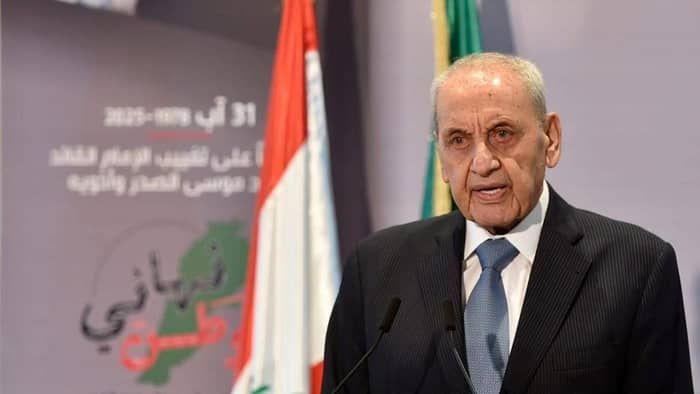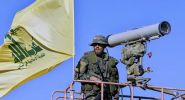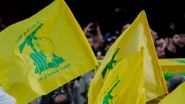
Parliament Speaker Nabih Berri marked on Sunday the 47th anniversary of the disappearance of Imam Musa al-Sadr with a speech that emphasized time and his call for dialogue on a national defense strategy and the future of arms. This is a key demand of Hezbollah, which rejects the government’s plan to establish a state monopoly over weapons.
His televised speech came days before the government is expected to examine a disarmament plan drafted by the army for the disarmament of militias, notably Hezbollah.
While avoiding direct comment on the government’s proposed process, he warned against “any attempt to throw the ball of fire into the army’s court,” accusing Washington of seeking, through its roadmap for Lebanon, to replace the ceasefire agreement with Israel that ended, in November 2024, the war into which Hezbollah had drawn Lebanon.
Berri warned against the dangers of rising sectarianism and political polarization, taking aim at Hezbollah’s local opposition, without naming them. “Evil-minded spirits are more dangerous to Lebanon than the weapons of the resistance.”
“Beware of fanaticism and the hate speech that prevails today,” he said, urging all parties to work toward a calmer national atmosphere, amid growing internal tensions and a war of words between Hezbollah and its opponents.
On the divisive issue of weapons, Berri reiterated openness to dialogue. “We are open to calm and consensual dialogue on the fate of weapons, with the aim of reaching a national defense strategy. But such dialogue cannot be conducted under threat,” he stressed.
Reflecting on past milestones, Berri recalled the return of residents to the South after the war, noting, “When we called on the people of the South to return home, we extended our hand to everyone. We organized the presidential election and formed a government, and we are grateful to all those who welcomed our brothers.”
Berri has implicitly situated the project of Hezbollah’s disarmament not as part of a genuine official effort to rebuild the state and extend its authority over all of Lebanese territory, but rather as a political power struggle aimed at altering the balance of forces in the country.
And while his criticism was mainly directed at sovereigntist formations, particularly Christian ones, he was careful to frame his remarks in strictly political terms. “This is a sample that does not resemble the Lebanese who opened their homes—in Qaa, in Deir al-Ahmar, in North Lebanon, in the mountain and in Beirut—to welcome the people of the South. We will never forget that, as long as we live,” he said.
Nevertheless, Berri expressed support for a debate on the weapons issue, “but conducted calmly and consensually, in the perspective of a national defense strategy, based on the provisions of the Constitution, the inaugural address, the ministerial statement and international charters,” thus echoing Hezbollah’s rhetoric.
He concluded, “We are advocates of Lebanon’s unity and cooperation. We have worked together to accomplish major milestones, and we will continue to work together to preserve Lebanon and the South of the country.”



Comments